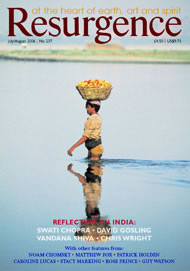NOT ONLY THE world of politics and business, but even much of the environmental movement is driven by fear. “We should take care of planet Earth, or else!” “We should reduce carbon emissions, or global warming will bring an end to civilisation.” “We should use less petroleum, or the oil will run out.” These are the fears behind much environmental thinking. Many of the books published in the past few months rest on the premise that the end of the world is nigh unless we change our ways.
Fear seems to rule our lives, our politics and our world. Fear of terrorism, fear of death, fear of old age, of loneliness, of illness, of being attacked or abused: fear, fear, fear.
Because of fear we build nuclear weapons and then to save ourselves from nuclear weapons we build nuclear bunkers! Because of the fear of scarcity we pursue economic growth; economic growth causes global warming; to save ourselves from global warming we want to cover the Earth with wind turbines or nuclear power stations, which take out land from food production, which causes scarcity … The karmic vicious circle of fear goes round and round.
As Albert Einstein said, you cannot solve a problem with the same mindset that caused the problem in the first place. Fear is the cause of environmental problems, which cannot be solved by fear of global catastrophe.
In the past we used to be told, “Be good, or you will go to hell.” Now we say, “Be environmentally friendly, or civilisation will come to an end.” Fear is a bad reason for being a good environmentalist. There are better reasons to care for the Earth. Living in harmony with the Earth is good in itself. Sustainable, frugal, simple and compassionate ways of living are fair to all beings – humans and other than humans. A culture of nonviolence, respect and reverence for life has to become part of our psychological make-up. Even if there were no global warming and no shortage of oil, we should not be destroying life, because life is sacred. And through gratitude to life we are enchanted and inspired and happy. Caring for the Earth community, which includes the human community, is a matter of joy, and not a matter of compulsion. Ecology or environmentalism is a way of life, not a way of crisis management.
Questions of global warming, population, organic growing and international terrorism are all issues that need to be faced and understood in the context of the intrinsic value of ecological lifestyles, and not as a response to scare stories.
SATISH KUMAR







